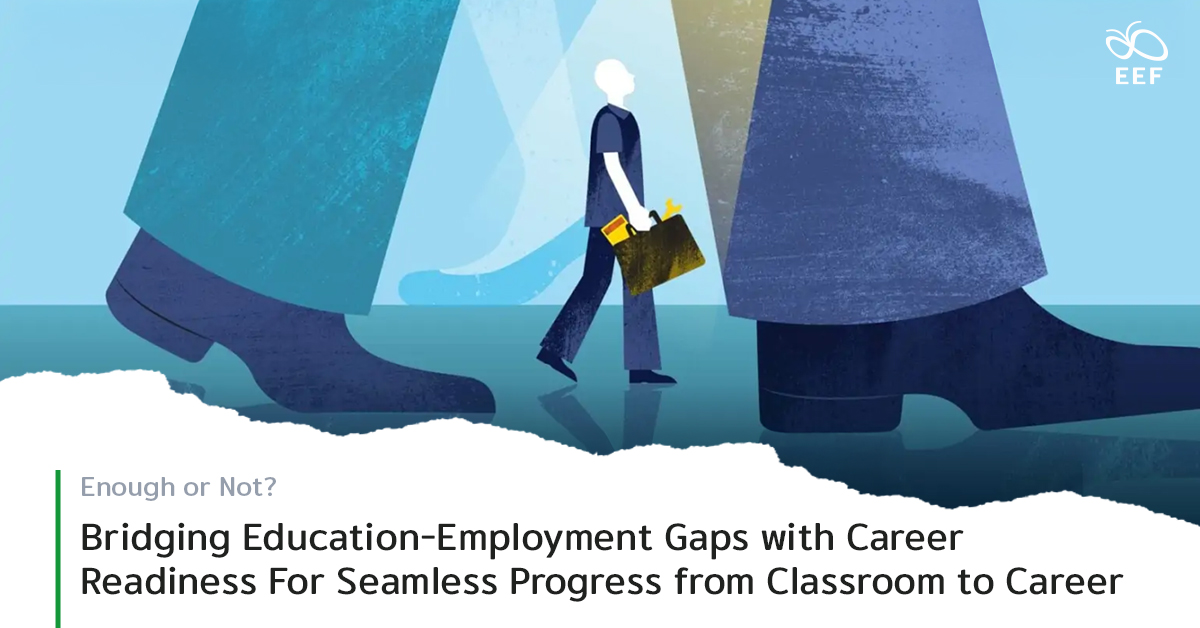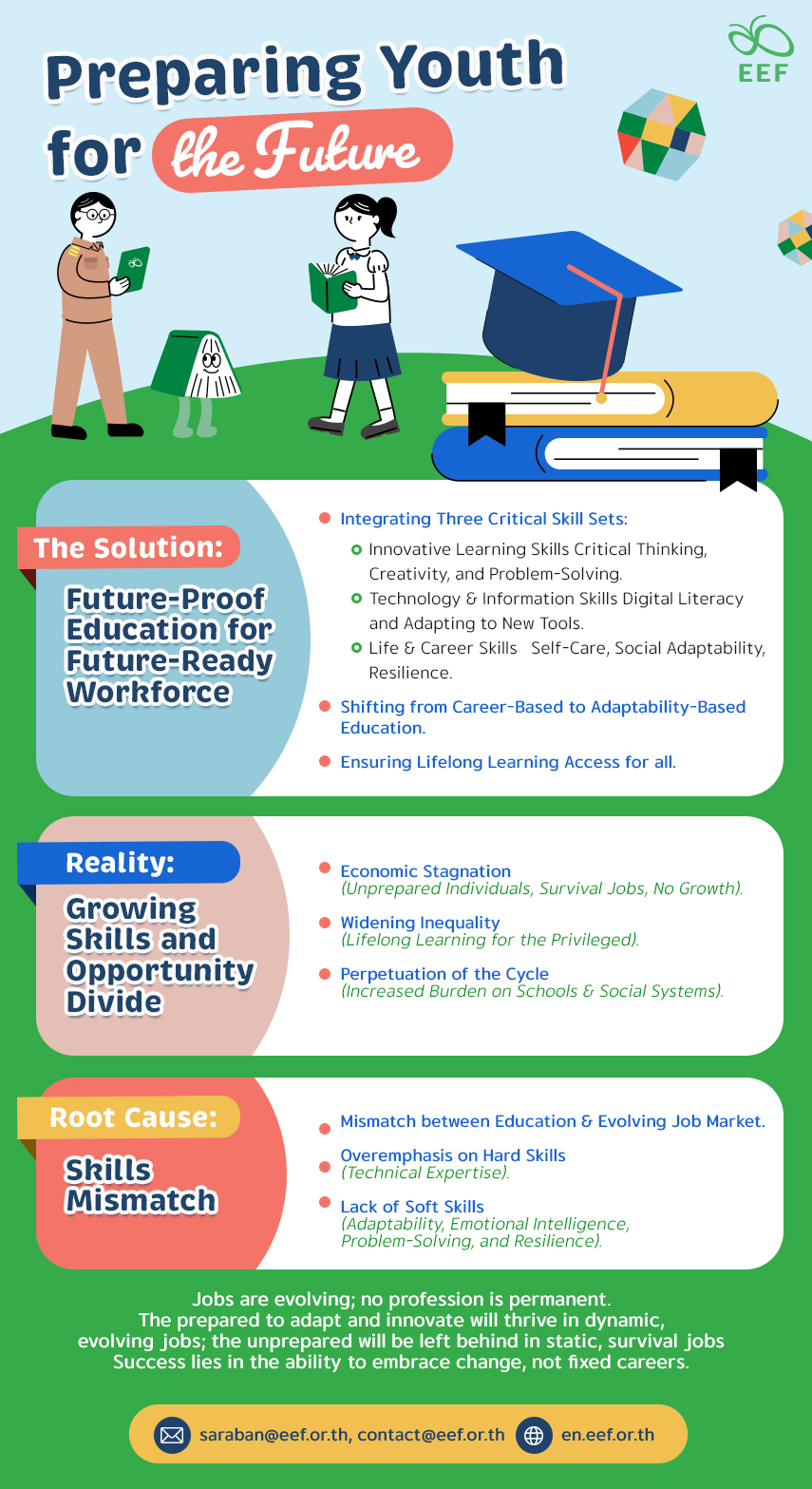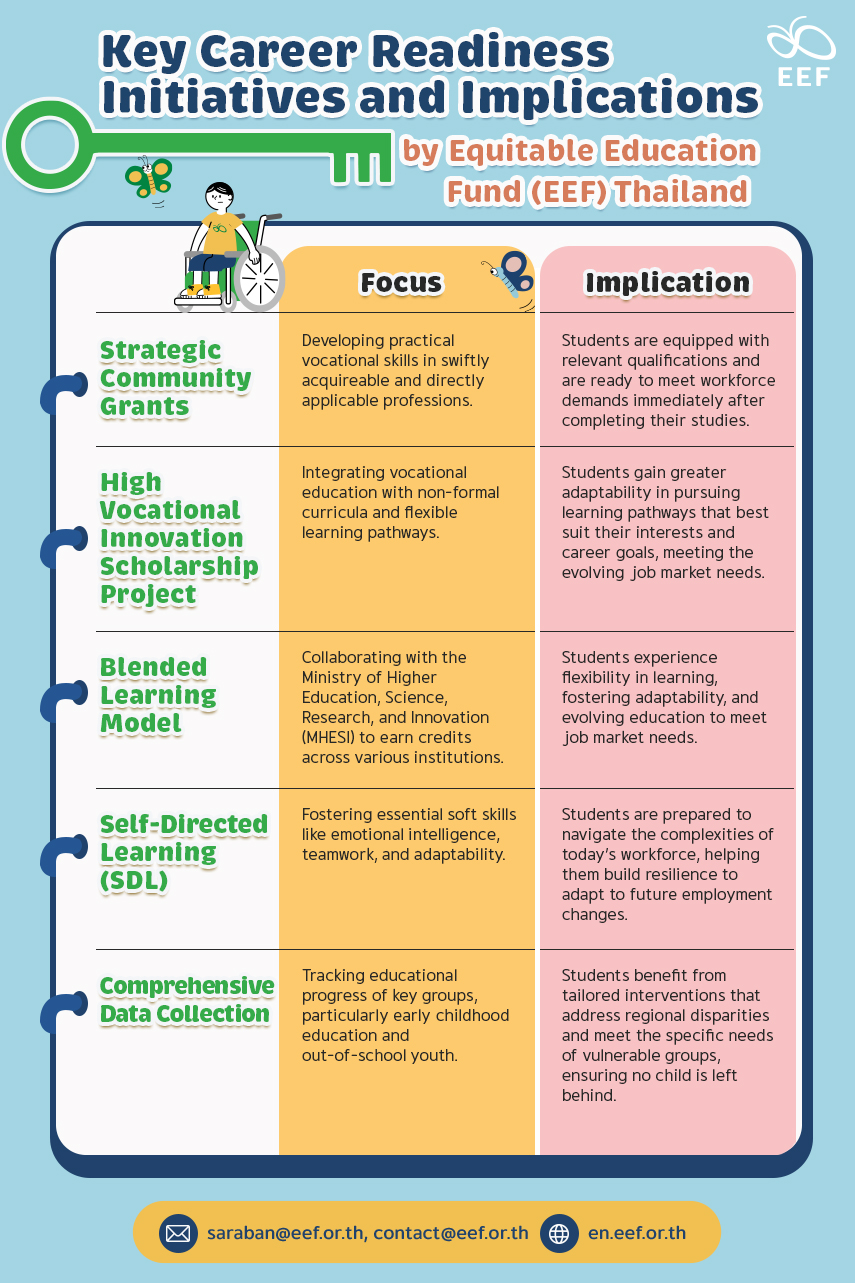
Despite increasing university enrolment, the growing disconnect between education and employment exacerbates the skills gap, costing the Thai economy an estimated 200 billion Thai Baht annually. This misalignment underscores a critical need: to bridge the divide between education and employment. Beyond strengthening early educational foundations, it is essential to redefine “Career Readiness” — a child’s preparedness to enter the workforce. Career Readiness extends beyond the classroom, integrating practical skills, vocational training, and industry-aligned learning pathways to ensure students are equipped to navigate and thrive in the changing workforce, not just through academic completion, but as comprehensive preparation for an ever-evolving labor market.
The gap between education and employment is widening, and the consequences are felt most acutely by the most disadvantaged. In Thailand, the poorest 20% of the population face immense financial barriers, with only 5% advancing beyond compulsory education. These financial constraints — four times heavier than those faced by wealthier families — push many young people into unskilled labor, perpetuating structural inefficiencies in the workforce. Nowhere is this more pronounced than the manufacturing sector, where 83.5% of jobs are reliant on unskilled labor — the highest in ASEAN. Despite increasing university enrolment, the growing disconnect between education and employment exacerbates the skills gap, costing the Thai economy an estimated 200 billion Thai Baht annually. To address this, a shift is needed towards redefining “Career Readiness” — a child’s preparedness to enter the workforce, preparing students not only to complete their academic journey but to navigate the ever-evolving job market with practical skills, vocational training, and industry-aligned learning pathways. While “School Readiness” — a child’s preparedness to engage with structured learning environments — provides the critical foundation for engaging with education, it is “Career Readiness” that ultimately ensures young people are well equipped to seamlessly transition into employment and thrive in today’s workforce, providing them with the tools to break the cycle of inequity.

To address this, the Equitable Education Fund (EEF) Thailand, in collaboration with Thammasat University, has developed the “Career Readiness Survey” (CRS) to assess youth readiness for employment, specifically addressing the skills gap employers expect. Building upon the foundation of the “School Readiness Survey” (SRS), which measures early childhood preparedness for formal education, the Career Readiness Survey extends this approach to evaluate how well young people are equipped for the labor market. This initiative not only serves as an evaluative tool but also as a strategic mechanism, enabling coordinated efforts to refine educational systems. By aligning curricula with labor market demands, it fosters greater equity and sustainability in education, ensuring that both foundational learning and workforce readiness are prioritized.
From early findings, a crucial insight emerges: career preparation must shift away from channeling students into specific professions; instead, emphasis must be placed on equipping them with the skills and mindset necessary to navigate an ever-evolving workforce. No profession, however stable it may seem, remains immune to change; adaptability — not predetermined career paths — should lie at the heart of education. Only by cultivating this flexibility can young people seize emerging opportunities, sustain themselves through career shifts, and thrive even as certain roles fade into obsolescence.
Preparing Youth for the Future
The Solution: Future-Proof Education for Future-Ready Workforce

The EEF is at the forefront of addressing the evolving needs of disadvantaged and marginalized children, ensuring they are equipped with the vocational skills necessary for today’s labor market. By focusing on targeted skill development, enhanced vocational pathways, and continuous assessment, it bridges the gap between qualifications and job opportunities, reducing overeducation and enhancing employability. Through tailored training that aligns with regional labor demands, the EEF offers students the opportunity to earn while they learn, enabling a smooth transition into the workforce. This approach not only meets immediate employment needs but also sets the foundation for long-term career success.
Key Career Readiness Initiatives and Implications
by Equitable Education Fund (EEF) Thailand

By embedding these proactive, targeted efforts into its framework — targeted skill development, enhanced vocational pathways, and continuous assessment, the EEF exemplifies how education can be transformed into a tool for empowerment. Through these strategies, the EEF is fostering national progress and creating pathways for marginalized groups to thrive, bridging the gap between education and the workforce. This approach ensures all students are equipped to contribute to and benefit from a changing labor landscape. Education must no longer be seen merely as a means of personal advancement; it must serve as a catalyst for national progress, cultivating a generation capable of reshaping Thailand’s labor landscape.
Despite significant progress in addressing educational gaps, disparities in school and workforce readiness remain a challenge in Thailand. The Equitable Education Fund (EEF) Thailand has developed tools to monitor school and career readiness, including the data-driven School Readiness Survey (SRS) and Career Readiness Survey (CRS). These tools underscore the interconnectedness of school and career readiness, recognizing that early educational preparedness is essential for future workforce success. By evaluating both, the EEF aims to reduce educational inequalities and align education with labor market demands. This integrated approach ensures a seamless transition from the classroom to the workforce, equipping youth with the skills needed to succeed in a competitive world. Through this comprehensive initiative, the EEF fosters a more equitable educational ecosystem, preparing all children for future opportunities and challenges. This effort aligns with the United Nations’ Sustainable Development Goal 4 (SDG4) to provide equitable and inclusive education, ensuring quality education and lifelong learning for all.
All For Education is all about people; only when all is in for education is Education For All. Join the movement to reduce educational inequality. Support the EEF by donating to fund research, partnerships, and assistance for children, youth, and adults in need of educational support. Click the link to contribute today and help create a society where education is open and equal for all. Together, we can make a lasting impact.

